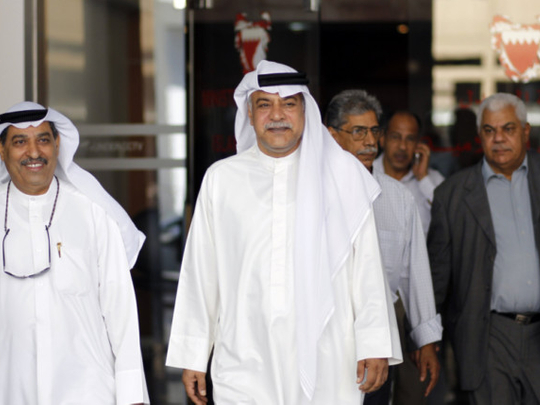
Manama: Crown Prince Salman Bin Hamad Al Khalifa has updated Bahrain’s community leaders on the latest developments in the progress of the national dialogue and discuss the way forward.
A statement from his court said that Prince Salman, who is also Bahrain’s first deputy prime minister, “met community leaders and key figures to discuss the outcomes of the current phase of the National Dialogue.”
“The meeting focused on developments from the National Dialogue’s recent bilateral talks and highlighted the key areas of common ground and broad agreement reached between the parties involved,” the statement said late on Tuesday.
“In updating community leaders on the developments and seeking their input, His Royal Highness now sought to reach yet broader consensus and agreement on these outcomes, demonstrating the kingdom’s firm commitment to addressing the interests of all its people as part of the reforms initiated by His Majesty King Hamad,” the statement said.
The outcomes of the national dialogue will be presented to the parliament lawmakers who will be elected later this year as they are the ones “who have the constitutional authority for their necessary implementation.”
The quadrennial parliamentary elections will be held for the fourth consecutive time since the reforms were launched in 2002 following a constitutional hiatus of nearly 30 years.
While several hopefuls have publicly expressed their intention to run, the opposition has not issued a final stance on whether it will field candidates for the 40 seats in the Council of Representatives.
However, Prince Salman in his meeting on Tuesday stressed the significance of participation.
“With the current stage of National Dialogue now nearing completion, it is incumbent upon the people of Bahrain to fully express their views through positive participation in the forthcoming elections, as their newly elected representatives will bear the ultimate responsibility for enacting the Dialogue’s major outcomes,” the statement said.
Initial reactions offered support for the Crown Prince’s drive to help the nation overcome its worst crisis in modern times resulting from a deep social spilt over the dramatic events that unfolded in February and March 2011.
Prince Salman, who has often stressed that a dialogue involving all segments of society was the only way forward for the nation, stepped in last January in the widening rift between parties involved in the national dialogue that caused the talks to be suspended.
Having succeeded in the damage control initiative, he has since then worked with the various parties to reach a common ground that will allow them to move forward.
According to Prince Salman, the absence of dialogue would mean compounding a difficult situation and in December 2012, he warned against allowing differences to grow.
“Geo-politically, demographically and historically, the differing political views represented in disparate political groups here in Bahrain must be reconciled. They will only be reconciled by sitting together and agreeing a framework where the limit of what is acceptable is the limit of what is unacceptable to the other, with the ultimate goal being to reach an agreement,” Prince Salman said as he opened the Manama Dialogue, an international security conference held annually in the Bahraini capital.
“I am not a prince of Sunni Bahrain; I am not a prince of Shiite Bahrain. I am a prince of the kingdom of Bahrain and all mean a great deal to me personally … Meetings must take place to prevent us from sliding into an abyss that will only threaten all of our national interests as we, here in the kingdom of Bahrain, although small, are large in what we symbolise, what we represent and what we have achieved,” he said.












